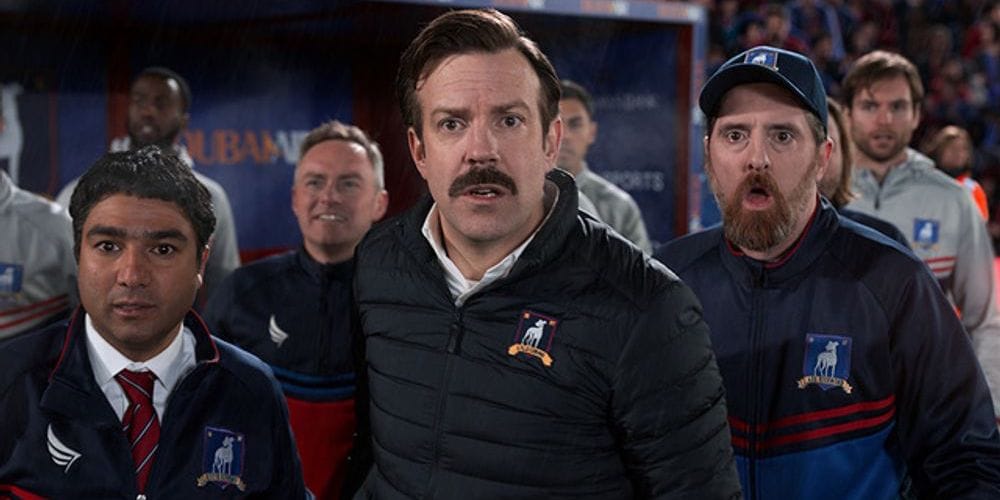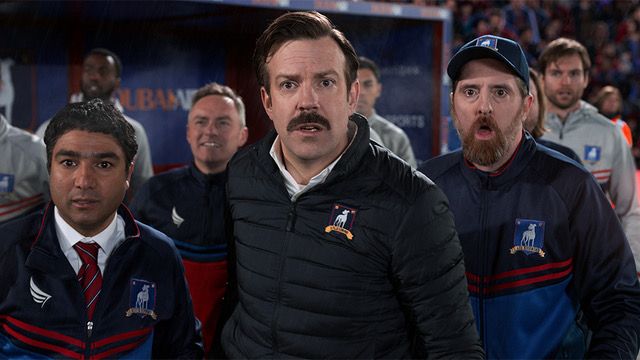Ted Lasso is a Comedy with Complexity
Ted Lasso swept the Emmy's last week, picking up seven wins. But while some have praised the show as light-hearted, contributing writer Ethan Samuels '23 argues that these critics underestimate the show's skill at handling important and sensitive issues.


Last week’s Emmy Awards were dominated by “Ted Lasso," a television series that lies at the intersection of sports, humor and drama. The show picked up wins in seven categories: Outstanding Comedy Series, Outstanding Lead Actor In A Comedy Series (Jason Sudeikis), Outstanding Supporting Actress In A Comedy Series (Hannah Waddingham) and Outstanding Supporting Actor In A Comedy Series (Brett Goldstein), among others.
The Apple TV+ hit follows the fictional Ted Lasso (Jason Sudeikis), a former Kansas football coach hired by Rebecca Walton (Hannah Waddingham), the owner of an aggressively mediocre Premier League soccer team, in an attempt to spite her superfan ex-husband. Although Lasso has no experience with The Beautiful Game, his unrelenting optimism bridges gaps between a divided locker room, eventually winning over the hearts of the players, fans and Walton herself.
Much of the “Ted Lasso” praise emerges from the notion that the show offers something society desperately needs in 2021: truly kind characters delivering light-hearted, apolitical laughs. But this sentiment, however common it may be, misses the point entirely.
“Ted Lasso,” especially in season two, is anything but light-hearted. How can a show whose protagonist constantly struggles with the effects of his father’s childhood suicide be labeled light-hearted? And how can a show that spends an episode tackling the incredibly timely issue of athlete protests — specifically against an oil company covering up environmental degradation in Nigeria — be apolitical?
Critics desperately want “Ted Lasso” to be an escape of the last 18 months. They want the show to be the feel-good haven where they can tune out of the real world. They want “Ted Lasso” to be “Friends” or “Seinfeld.” But it’s not, and it shouldn’t be.
Here are just two of the hundreds of quotes that embody the ethos of “Ted Lasso.”
Season 2, Episode 3: “Honestly when bad things happen to, uh, people like me [white men] y'all have a tendency to write about it without being asked. Sam had to go and get y'all's attention, you know? So, if you have any more you wanna know about, you can ask [Sam].”
Season 2, Episode 7: “I can diagnose myself in a heartbeat. I thought being invulnerable would protect me, so I pushed people away for years, leading me directly to my greatest fear: Being alone.”
Ted Lasso is not “Friends” and it is not “Seinfeld.” Shoving the show into the genre of mindless, feel-good comedies is an injustice, not only to the show and its creators, but to the issues “Ted Lasso” grapples with: toxic masculinity, mental health and divorce, to name a few.
And yet, at the same time, “Ted Lasso” is a comedy that feels good. At its core, that’s the only way to describe it. As a review from The New Yorker articulated, “You don’t discuss what the show is about but, rather, how it feels to watch it.” And watching “Ted Lasso” feels like when Francesca Romero asks to slow dance with you at Max Rubenstein’s 2013 Bar Mitzvah. It’s akin to hitting a walk-off double against Collin, your childhood arch-enemy, the biggest asshole in your town, in a 2011 Little League baseball game.
Ted Lasso, the mustached midwestern football coach whose quixotic optimism is at times overwhelming, navigates his world in a way so unique it forces you to smile. For example, when asked if he believes in ghosts, Lasso responds, “I do, but more importantly, I believe they need to believe in themselves.” He’s the underdog that says, “Even Buzz and Woody got under each other’s plastic,” and “If we see each other in our dreams, let’s goof around a little bit, pretend like we don’t know each other.”
The success of “Ted Lasso” is driven by its unique ability to make audiences feel so warm while the characters grapple with real, uncomfortable issues. Instead of replacing the real world with feel-good sentiments, Sudeikis does the opposite. He unites them. And yes, at times it does seem a bit much, almost as if the show is trying too hard to make you chuckle. But in these moments, even when the show is flirting with cheesiness, it’s so much easier to give in to the urge to smile.





Comments ()